Russian and CIS investment outlook in overseas real estate – A survey by Tranio, 2020
Tranio conducted its eighth annual survey, analysing the investment and property purchasing patterns of Russian and CIS nationals abroad. The survey was primarily focussed on income property, looking at the top locations for investment, yield expectations, budgets, and preferred asset classes, as well as the general presence of Russian-speaking investors in local markets.
A total of 686 respondents from 38 countries participated in the survey – these included both Russian and non-Russian speaking real estate agents, brokers, developers, and consultants who work with Russian-speaking investors abroad. The report was compiled based on data collected in 2018 and 2019.
1. Top locations for Russian income property investors
In which cities and regions do clients from Russian-speaking countries most actively buy income property?
In most countries, respondents identified one or two of the most popular locations, however, in some countries respondents identified more than two such locations.
Cities and regions where Russian-speaking investors are most actively buying income property
| Austria | Vienna, Salzburg, Styria |
| Bulgaria | Burgas, Varna, Sofia |
| Croatia | Adriatic coast of Istria, Split |
| Cyprus | Limassol |
| Czech Republic | Prague, Karlovy Vary |
| Dominican Republic | Punta Cana |
| Estonia | Tallinn |
| Finland | Helsinki |
| France | French Riviera |
| Georgia | Batumi, Tbilisi |
| Germany | Berlin, Munich, Frankfurt |
| Greece | Athens, Peloponnese, Halkidiki |
| Hungary | Budapest |
| Israel | Tel Aviv |
| Italy | Tuscany, Milan, Rome, locations near lakes |
| Latvia | Riga |
| Montenegro | Budva, Tivat |
| Portugal | Lisbon |
| Slovenia | Ljubljana |
| Spain | Costa Blanca, Costa del Sol, Barcelona |
| Switzerland | Geneva |
| Thailand | Phuket, Pattaya |
| Turkey | Istanbul |
| UAE | Dubai |
| UK | London |
| USA | Miami |
Some cities stand out in comparison to other locations. In several countries, 100% of respondents indicate that Russian-speaking investors prefer capitals: Riga (Latvia), Lisbon (Portugal), Ljubljana (Slovenia), and London (UK).
Several other capitals are mentioned alongside other locations 75% of the time: Vienna (Austria), Limassol (Cyprus), Berlin (Germany), Athens (Greece), and Budapest (Hungary). In other countries, the majority of respondents indicate that Russian-speaking investors prefer large cities other than capitals like: Budva (Montenegro), Geneva (Switzerland), and Istanbul (Turkey).
In three cases, areas that are neither capital cities nor large cities received the majority of votes among Russian-speaking respondents, but little mention among non-Russian-speaking respondents. These locations are the French Riviera (France), Halkidiki Peninsula (Greece), and Costa Blanca (Spain).
Conversely, non-Russian-speaking respondents mentioned Athens twice as often as Russian-speaking respondents, while Spain’s capital Madrid was mentioned by 43% of non-Russian-speaking respondents and not by a single Russian-speaking respondent.
2. The activity of Russian investors abroad
A total of 42% of respondents believe that Russian-speaking buyers do not have a significant presence in the market compared to other foreign investors. This view dominates in more than half of the countries where the survey was conducted.
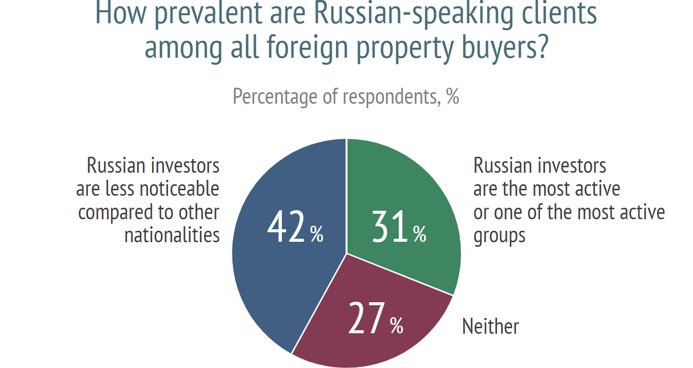
The absence of Russian-speaking buyers is particularly noticeable in the UK, UAE, Portugal, and Switzerland (80% of respondents in each of these countries said so). This option also received more than half of the votes in Austria, Italy, and France.
Conversely, the majority of respondents believe that Russians are the most active or one of the most active groups of buyers in Cyprus (73%), Montenegro (67%). and Greece (52%).
In Germany, the three options received roughly a third of the votes each, with a slight tilt in favour of “Russian speakers are less noticeable in comparison to buyers from elsewhere” (37%).
Real estate buyers from Russia and CIS are less noticeable compared to other nationalities overseas.
Respondents indicated that the activity of Russian-speaking real estate investors abroad has recently decreased. Buyers from Asia, primarily China, are coming out on top. Some respondents indicated that Russian-speaking investors are actually looking to sell their real estate assets abroad.
I think the number of Russian-speaking investors abroad has stabilised. Some segments are showing growth, like commercial property in Germany and lifestyle in Spain, but in general there’s much less to spend on resort properties because Russia’s GDP is not growing, while Russians are also being hindered by things like KYC procedures.
However, I expect more Russian investors to make their presence felt on foreign markets because incomes in the country will grow as Russian banks slash interest rates – it’s now possible to get 1% on dollar deposits and around 5% for ruble deposits. Those with capital will be forced to find ways to allocate capital in alternative instruments like real estate.
3. Income property vs. own use
Respondents estimated what proportion of all Russian-speaking buyers were investors of income property (as opposed to real estate for personal use). The answers from Russian-speaking compared to non-Russian-speaking participants differ by 1.4 times: Russian-speaking respondents said the share of income property investors is 42% while non-Russian-speakers estimated it to be 29%.
Russians tend to prefer investing through Russian-speaking consultants, not only because they speak the same language but such consultants often have more suitable contacts and understand certain cultural differences, which makes doing business easier.
However, Russians who are looking to invest €10M or more often have no problem working with local consultants.
What proportion of all Russian-speaking buyers are investors of income property, as opposed to real estate for their own use?
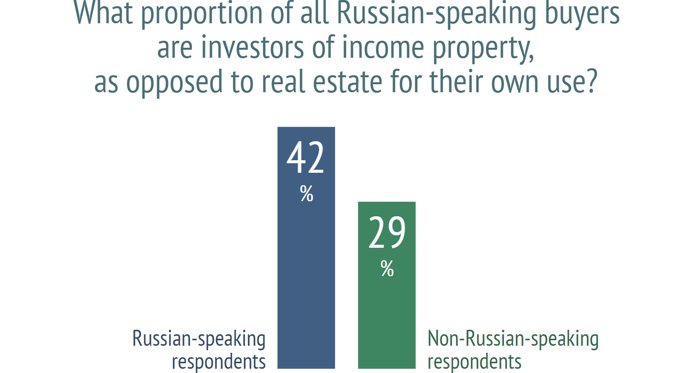
In most of the countries, if counted separately, the share of Russian-speaking real estate investors is close to the average level in all of the countries – there are very few deviations. Germany, where respondents estimated this share to be 70%, stands out drastically, so does Thailand, where respondents estimated the figure to be 65%. In the Czech Republic and Austria, respondents said that more than half of all Russian-speaking investors acquire income property.
In other countries, respondents said the vast majority of Russian-speaking clients purchase real estate for their own use. For example, in France, only 11% of respondents said Russian-speaking buyers purchase income property, while in Croatia, this figure stands at 17%. In Bulgaria and Latvia, the share of Russian-speaking clients buying income property is also low.
Germany has the largest share of Russian-speaking real estate investors. France has the smallest share.
Russian-speaking respondents in Spain said that the share of Russian clients who buy
income property in the country is 47%, while non-Russian-speaking respondents estimated this figure to be 11%.
4. Investment in value-added property
According to respondents in all countries, the share of Russian-speaking investors in value-added projects (development and redevelopment) is 17% on average. Unlike the previous question, there is no significant discrepancy between the answers of Russian-speaking and non-Russian-speaking respondents.
The share of Russian-speaking property buyers who invest in value-added projects abroad is around 17%.
In the Czech Republic (32%), as well as in Austria and Cyprus (both 29%), respondents indicated a relatively high share of development projects investors compared to other countries. Croatia and Bulgaria have the lowest share of such investors (4% and 8%, respectively) for this specific property type.
The higher the share of income property investors among Russian-speakers in a country, the higher the share of those investing in value-added projects.
Germany is the only country that does not conform to this trend. Although the share of Russian-speaking clients who purchase investment property in Germany is estimated to be at 70% of all buyers (both income property and property for personal use), the share of value-added investors was only estimated to be 10% (both income property and property for personal use) — a significantly lower figure compared to the average for all other countries.
There are more clients for core and core+ strategies in Germany because investors tend to consider this market for the long-term.
If someone wants a simple rental income, 80% of Russian-speaking investors will probably invest in Germany.”
The respondents clarified in the comments that most investors prefer a simple rental business because investing in development projects has a higher entry threshold, carries more risks, and requires greater investor involvement in project management.
5. The budget of Russian-speaking investors
The average real estate transaction among Russian-speaking investors is €1M or lower. At the same time, more than half of Russian-speaking respondents believe transactions of the lowest range (less than €300K) are the most popular type. The price range €300K-1M is the most popular among non-Russian-speaking respondents.
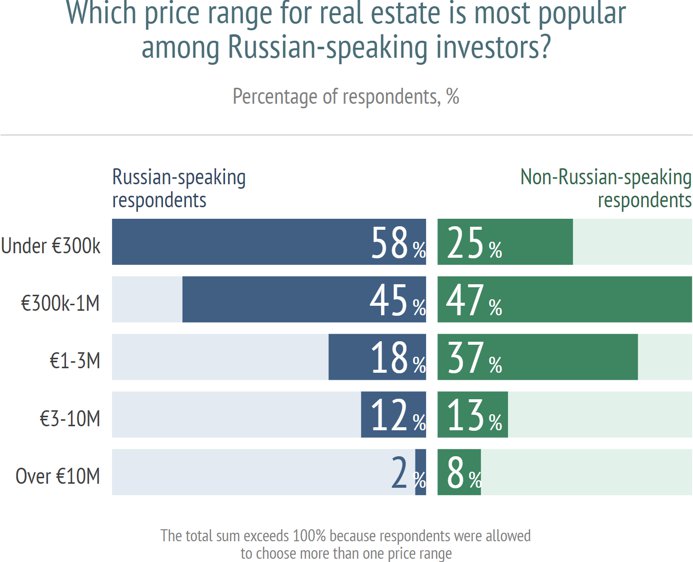
The United States appears to be the most “expensive” country: this is the only country where no respondent chose the lowest price range of less than €300K per transaction. The €1-3M and €3-10M price ranges were the most popular categories in the United States; both price ranges were marked by 50% of the respondents – 17% of the respondents indicated the highest price range of more than €10M. The total sum exceeds 100% because respondents were allowed to choose more than one price range as their answers.
Austria, where most respondents (67%) chose the €3-10M price range, is also above average. France, where the highest price ranges of €3-10M and over €10M were marked by 17% of respondents, falls in the same category, too.
The “cheapest” countries for Russian-speaking investors are Bulgaria, Turkey, and the Czech Republic. The lowest price range (under €300K) was chosen by 100%, 90%, and 80% of respondents respectively. No one from the respondents chose €1M or higher in these countries.
In the United States, the average budget of one transaction was the highest. In Bulgaria, Turkey and the Czech Republic — the lowest.
In Italy, opinion was polarised. Russian-speaking respondents said that most of the transactions with Russian-speaking clients were under €300K (44% of Russian-speaking respondents), while non-Russian-speaking respondents said that most transactions with Russian-speaking clients fell in the price range of €1-3M (45% of non-Russian-speaking respondents).
6. Preferred investment property type
Micro-apartments are marginally the most popular investment property type among Russian-speaking investors. This type of real estate was chosen by 46% of respondents, while 43% chose apartment buildings.
Apartment buildings are the most popular property type among non-Russian-speaking respondents (56%).
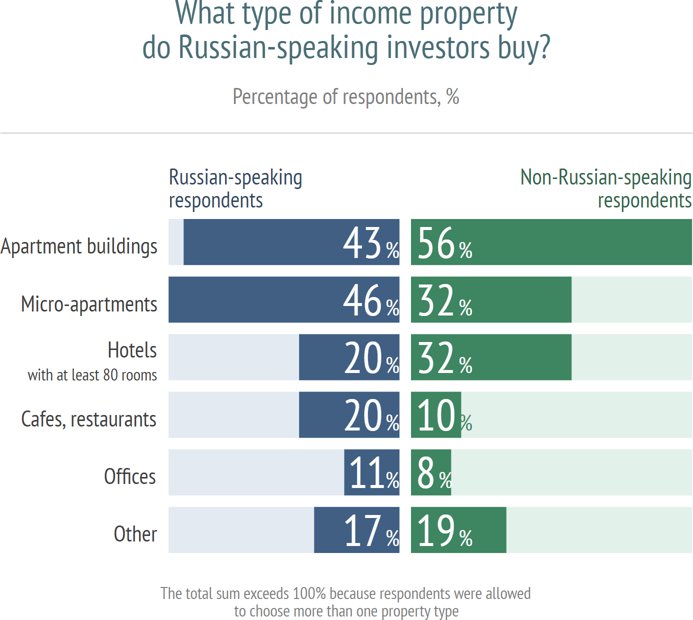
In all of the countries that took part in the survey, apartment buildings are the most popular property type for generating income with a total of 48%. An especially large number of respondents in Croatia (83%), Latvia (78%) and Greece (63%) chose this type of real estate. On the contrary, less than 20% of the respondents indicated this type of real estate for Bulgaria, Hungary, and Georgia.
The prevailing price range for apartment buildings is €300K-1M, which was chosen by 43% of the respondents.
Micro-Apartments are the leading category of real estate in 42% of the countries which participated in the survey. Respondents in Bulgaria (91%), the Czech Republic (82%), and Hungary (80%) marked this type the most. No respondents in Latvia and Turkey chose micro-apartments.
A total of 68% of respondents from all the countries combined said that Russian-speaking investors buy micro-apartments costing less than €300K (the lowest price range).
Micro-apartments are the most popular type of income property among Russian-speaking investors.
Hotels with at least 80 rooms are the most popular option among respondents in Austria (57%). This type of real estate was indicated by approximately one-third of respondents in Italy and Latvia.
The most popular price range for this type of property is €3-10M — selected by 33% of respondents.
Cafes and restaurants are the most popular investment option according to respondents in the United States (71%). This type of real estate was also popular among investors in Georgia (57%). A total of 44% of Russian-speaking respondents in Spain indicated this type of property, in contrast to no non-Russian-speaking respondents in Spain.
According to Russian-speaking respondents, cafes and restaurants priced €300K or less are popular with Russian-speaking clients. A total of 49% of respondents chose this category. In contrast, 50% of non-Russian-speaking respondents indicated that the most popular price range for cafes and restaurants among Russian investors is €1-3M.
Offices do not dominate in any of the countries in the survey, however, a substantial proportion of respondents in Slovenia (50%), Cyprus (40%), and the United States (29%) indicated this type of real estate.
When it comes to offices, the price ranged from €300k-3M, according to 66% of respondents from all countries.
Among other types of commercial real estate popular among Russian-speaking investors, respondents often mentioned retail stores, supermarkets (particularly in Germany), shopping centers, and B&B.
7. Yield expectations
Previous surveys conducted by Tranio reveal that Russian-speaking clients looking for real estate investments abroad have slightly unrealistic yield expectations. However, this survey bucks the trend with 60% of respondents saying that investors’ expectations are aligned with the actual market conditions.
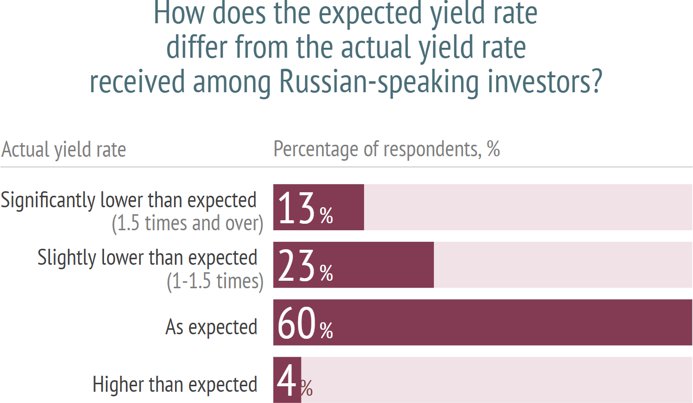
The “Actual yield rate is as expected” option is the leading answer in most of the countries that were surveyed – in 80% of the countries, this option attracted 50% or more of the total number of votes. This option has a particularly high share of votes in the Czech Republic (80%) and Latvia (78%). These figures may indicate that in these two countries, Russian-speaking investors’ expectations of returns are the most realistic.
As opposed to most of the countries in the survey, the “Actual yield rate is higher than expected” option prevailed in Bulgaria and Georgia, gaining 45% and 43% of votes, respectively.
The majority of respondents believed that Russian-speaking investors had realistic investment return expectations.
Germany is the only country where the “Actual yield rate is slightly lower than expected (1-1.5 times)” option was the most popular choice, with 48% of respondents marking this answer.
8. Reasons why real estate deals fall through
Although the majority of respondents agreed that the yield expectations match the current market conditions, exceeding expectations still remained the prevailing reason why real estate deals fall through when it comes to Russian investors. A total of 44% of respondents indicated this in the survey. The second most common reason for failing to close a deal relates to difficulties associated with finding a suitable property (31%). The first above-mentioned reason predominates in the replies of Russian-speaking respondents; the second reason predominates in the replies of non-Russian-speaking respondents.
Both of these problems are particularly pronounced in Germany. All of the Russian-speaking respondents and 45% of non-Russian-speaking respondents pointed out investors’ unrealistic expectations on returns. Half of both Russian-speaking respondents and non-speaking Russians indicated that it is difficult for buyers to find suitable property in Germany.
In neighbouring Austria, the situation is the opposite as only a fraction of respondents in this country indicated these problems: “Exceeding expectations of returns” was marked by 25% of respondents, while “Difficulty in finding a suitable property” was marked by 13% of respondents.
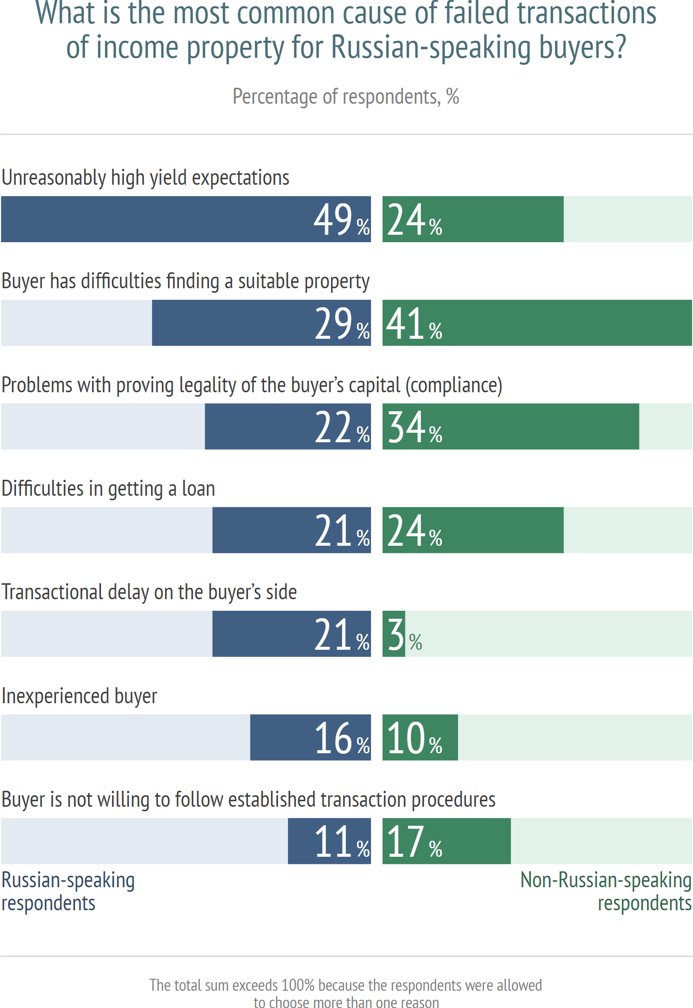
The majority of respondents in Latvia (78%) and conversely, a relatively small percentage of respondents in Turkey (17%), also mentioned the issue of unreasonably high yield expectations.
Buyers finding it difficult to find suitable property was marked by 60% of respondents in Hungary, while in the United States, on the contrary, not a single respondent marked this option.
The problem related to the proof of funds and compliance is especially acute in Austria (75%), Cyprus (64%), and France (57%).
Respondents in Germany (46%) and the Czech Republic (36%) highlighted “Transaction delay on the buyer’s side” – these were the two highest percentages for this option. No respondents marked this option as a problem in Bulgaria, Hungary, or the United States.
The "Buyer is not an experienced investor" option received the most votes from participants in Turkey (50%) and the United States (43%).
The main reasons for transactions falling through when it comes to Russian-speaking investors are: unrealistic yield expectations and difficulty in finding the right investment object.
Additional causes for transactional failures were also mentioned, including:
- The buyer’s budget is too small;
- Differences in mentality and culture;
- Lack of trust between the parties involved.
- Many respondents mentioned that a lack of trust sometimes arises due to incompetent or even dishonest mediators/agents acting between the owner and buyer of the property.
However, respondents who work with Tranio mentioned that the involvement of a competent and responsible broker facilitates successful transactions. Such brokers help all parties involved find a common language, prevent misunderstandings that might arise due to cultural differences, advise buyers on how to choose appropriate real estate objects and purchase and registration procedures, and help secure financing.
We will send you a content digest not more than once a week

